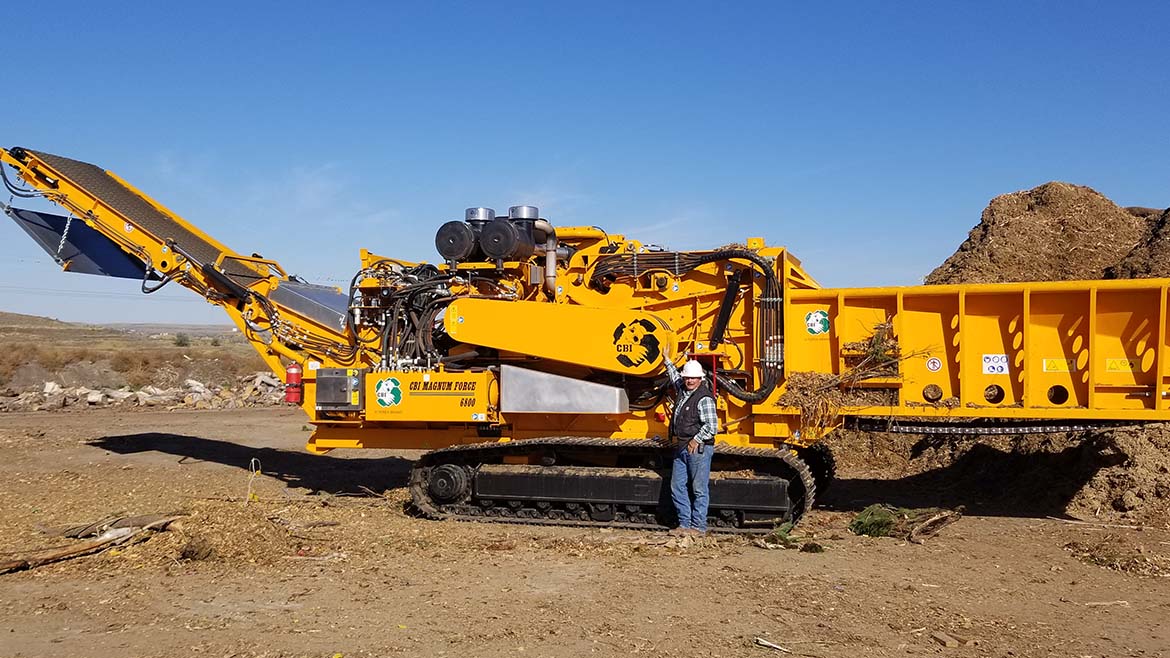Rapid City’s CBI increases compost production

This article originally appeared in the December issue of Recycling Product News.
RAPID CITY, SD – Jeff Barber has worked at the Rapid City Solid Waste Division for 18 years and currently manages their yard waste and landfill operations. The division processes three different types of compost: Municipal Solid Waste (MSW), yard waste, and a 50-50 MSW/yard waste mix. The MSW and 50-50 composts are processed in a controlled environment. The yard waste operation manually waters and turns compost to maintain an aerated, hygienically safe, and finished product.
The Rapid City Solid Waste Division is a regional facility. The waste they accept and process covers a large portion of Southwestern South Dakota. Due to the limited number of composting facilities, contractors in other counties—and even other states—rely on the landfill to accept material.
The Rapid City Landfill receives an average of 18,000 tons of yard waste annually. A significant amount of raw yard waste material is hauled in by landscape and mowing businesses in the surrounding region. Additionally, the facility sees a lot of pine trees and forest debris coming in from commercial fire remediation contractors who clean up around homes, trails, and parkways. A meticulous process converts raw materials to a refined product that meets environmental standards and the end-use needs of consumers.
Easier said than done.
Logs, trees, branches, and other materials are run through the horizontal grinder and put in windrows. Beyond watering and turning the windrows, the facility heats the piles to a perfect temperature (between 140-150 degrees Fahrenheit) and lets it slow-cook for 14 days into a fresh smelling, nutrient rich product.
“We try to get our compost to make the thirty to one carbon nitrogen ratio,” Barber explained. “If the carbon to nitrogen (C:N) ratio is too high in the compost pile, decomposition slows down. If the C:N ratio is too low, the pile takes on a foul odor. If you get it too hot you kill the good bacteria.”
The team maintains a productive balance by constantly processing waste their yard accumulates. One of the key tasks at the facility is grinding down carbon-rich, organic material into something that can be processed.
After the compost is held at ideal temperature for 14 days, a sample is brought to their lab to ensure it meets environmental standards.
Grinding is essential to the operation. In Barber’s 18-year tenure at the landfill, four days of grinding in a workweek had been the routine, until they invested in a CBI 6800BT Horizontal Wood Grinder for their application.
Now they grind one day a week, if that.
ACCELERATING WITH A CBI HORIZONTAL GRINDER
“What we grind now in a day used to take us three to four days,” Barber said. “We grind once a week and before we used to grind four or five days a week with our other grinder. It’s phenomenal how fast this thing runs material through it.”
The CBI 6800BT Horizontal Grinder has been specifically designed for land clearing companies, mulch producers, and yard waste processors like the Rapid City Regional Landfill who demand high-volume throughput and maximum reliability. It’s the first grinder ever made that can grind whole trees as fast as a 30" chipper can chip and process more material than the competition at a lower cost per ton. The 6800BT’s rugged design and unrivaled production rates gained recent popularity with hurricane debris contractors and make it a perfect fit for Barber’s team.
“Even when I help out our grinder operator, we can’t keep the machine fed with two loaders and stay caught up with the machine,” Barber explained. “The efficiency frees up one man. If we’re not grinding four or five days a week it frees up a guy to run a windrow or a packer.”
They’ve had zero downtime with the horizontal grinder. As a result, more green waste is recycled for its eco-friendly purpose and the pile at their facility stays at a manageable and safe size. A secondary benefit to the high-production has been fire safety.
“The grinder keeps our pile smaller so we don’t have to worry about fire,” Barber said. “In years past we’ve had some major fires out here with our bulk pile getting too big. We’re able to manage it well now.”
Beyond cutting their grinding time down to a fourth of their previous benchmark, the 6800BT’s staying power and maintenance-friendly design helps Barber’s team get the most out of the day. Maintenance tasks that used to take an hour now take 15-20 minutes.
A SIMPLE AND EFFICIENT WOOD GRINDER
“It’s a very simple machine and everybody was surprised with how open it is to work on it and where the hydraulics are located,” Barber said. “Everything is easy to get at and easy to grease. You can open the throat up in it and change the teeth. You can change the whole set of teeth in about twenty minutes.”
A recent compost sale was available for nearby residents for next spring’s growing season. The product was 50/50 compost, providing a sustainable solution at a bargain price.
Rapid City Regional Landfill is more focused than ever on safe, efficient, and environmentally friendly waste services for the community. This includes residential collection of curbside recycling and operation of a Material Recovery Facility (MRF) to accept, sort, and bale household plastics, steel, newspaper, and cardboard. The City’s diversion of yard waste, MSW, and recyclables has and is helping to extend the useful life of the Rapid City Landfill.
Click here to learn more about CBI Horizontal Grinders.
